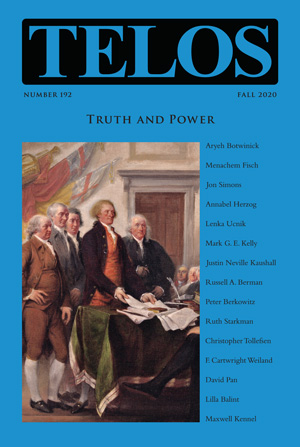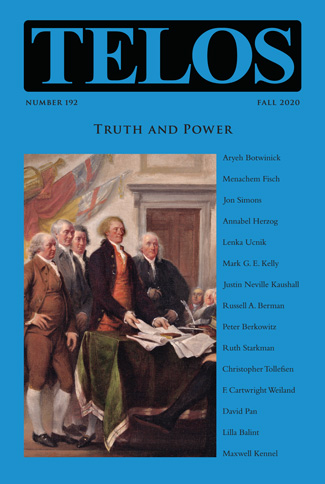By Mark G. E. Kelly · Tuesday, October 20, 2020 Mark G. E. Kelly’s “Is Fascism the Main Danger Today? Trump and Techno-Neoliberalism” appears in Telos 192 (Fall 2020): Truth and Power. Read the full article at the Telos Online website, or purchase a print copy of the issue in our online store. Individual subscriptions to Telos are available in both print and online formats.
 In this article, I argue against the prevalent tendency, both in popular and scholarly discourse, to understand the Trump presidency as representing an incipient American fascism. I point out that Trump’s actual administration has shown no features distinctive of fascism, and that all alleged fascist policies of Trump are deeply in continuity with the pattern of liberal U.S. politics. I further argue that the most extraordinary aspect of Trump’s presidency, his strident rhetoric, while representing a deviation from U.S. politics as usual, is nonetheless not distinctively fascist. Lastly, I point out that, while Trump’s rhetoric and policies have drawn him support from literal fascists, he has little real connection with them and has largely disappointed rather than encouraged them. Instead, I suggest that Trump’s presidency represents the opposite of robust use of state power we associate with fascism, namely, a further decline in federal executive power in favor of the power of corporations. I conclude by suggesting that the increase of the censorious power of Big Tech in particular represents a far greater threat to democracy than Trump, and that the left’s monomaniacal focus on opposing Trump has allowed this tendency to go unchecked. In this article, I argue against the prevalent tendency, both in popular and scholarly discourse, to understand the Trump presidency as representing an incipient American fascism. I point out that Trump’s actual administration has shown no features distinctive of fascism, and that all alleged fascist policies of Trump are deeply in continuity with the pattern of liberal U.S. politics. I further argue that the most extraordinary aspect of Trump’s presidency, his strident rhetoric, while representing a deviation from U.S. politics as usual, is nonetheless not distinctively fascist. Lastly, I point out that, while Trump’s rhetoric and policies have drawn him support from literal fascists, he has little real connection with them and has largely disappointed rather than encouraged them. Instead, I suggest that Trump’s presidency represents the opposite of robust use of state power we associate with fascism, namely, a further decline in federal executive power in favor of the power of corporations. I conclude by suggesting that the increase of the censorious power of Big Tech in particular represents a far greater threat to democracy than Trump, and that the left’s monomaniacal focus on opposing Trump has allowed this tendency to go unchecked.
Continue reading →
By David Pan · Friday, September 25, 2020 Telos 192 (Fall 2020): Truth and Power is now available for purchase in our store. Individual subscriptions to Telos are also available in both print and online formats.
 There is a strong temptation to oppose the idealism of truth to the realism of power in order to criticize and turn away from politics as a base pursuit. Science, facts, and ideals are cited as the objective truths that so often are ignored in favor of ideology, lies, and self-interest by those who wield power. Yet this opposition between truth and power can itself become a dubious tactic, as it is often the speaker who seeks to define an opinion as truth. This situation is complicated by the circumstance that there are three forms of truth that are often merged in such discussions. There is a strong temptation to oppose the idealism of truth to the realism of power in order to criticize and turn away from politics as a base pursuit. Science, facts, and ideals are cited as the objective truths that so often are ignored in favor of ideology, lies, and self-interest by those who wield power. Yet this opposition between truth and power can itself become a dubious tactic, as it is often the speaker who seeks to define an opinion as truth. This situation is complicated by the circumstance that there are three forms of truth that are often merged in such discussions.
First, there are natural scientific truths that even autocrats and totalitarians do not seek to deny, as they are the source of the technological tools that can support any attempt to maintain power. Here, there is certainly no conflict between truth and power. Not only does political power depend on technological achievement, but natural scientific facts cannot be covered up by lies and ideology for long. Consequently, political actors must pay attention to natural scientific and technical knowledge, even if they then instrumentalize it in different ways.
Continue reading →
By Saladdin Ahmed · Wednesday, March 18, 2020  There are three reasons to believe that COVID-19 is a communist agent. First, it is universalist; it does not recognize or respect national borders. Second, it is atheist; it has forced cancellations of pilgrimages, along with thousands of other religious rituals. Third, it has been threatening the capitalist economic order across the globe. There are three reasons to believe that COVID-19 is a communist agent. First, it is universalist; it does not recognize or respect national borders. Second, it is atheist; it has forced cancellations of pilgrimages, along with thousands of other religious rituals. Third, it has been threatening the capitalist economic order across the globe.
Perhaps it is inappropriate to joke about COVID-19. However, the pandemic’s increasing traumatic effects across the world are precisely the reason we should also joke about it. Those of us who have lived through calamities realize that sarcasm, far from being disrespectful to human suffering and loss, can be nobler than any serious expression that will inevitably undermine the actual experience. Those of us who have lived through something along the lines of the following examples know the indispensability of sarcasm: living defiantly in the face of the terror devised by a totalitarian regime; being a political prisoner under a fascist regime; taking the first physical steps to leave every place and everyone one has ever known; or, crossing bloody borders in a mythic-like quest in search of a place where one can continue to exist, even if merely as an ontological mistake. Humor is almost a natural coping mechanism when everydayness becomes a struggle for survival. One can easily observe that despite the apparent contradiction, there is more laughter among political prisoners who are facing death than among the affluent in luxurious social settings that are prepared specially to prevent boredom and dread.
Continue reading →
By Saladdin Ahmed · Thursday, December 12, 2019 For decades, Sunni Islamism was led by Saudi Wahabism, while the Muslim Brotherhood developed strategies for taking over governments. When King Salman assumed power in Saudi Arabia in 2015, a major shift took place in Saudi politics. For the first time in the history of the kingdom, Wahabis were confronted in the centers of power. This coincided with the escalation of Turkey’s Islamist ambitions to become the leading Sunni imperial power, led by Erdoğan. The center of Sunni Islamism gradually moved from Saudi Arabia to Turkey, and this was reinforced when the Saudis came out in support of Abdel Fattah el-Sisi in Egypt against the Muslim Brotherhood’s attempts to reinstall their ousted president, Mohamed Morsi. Erdoğan, on the other hand, lost a strategic ally when Morsi was deposed by el-Sisi.
Parallel to this shift of the Sunni centers of gravity, Al-Qaida was losing ground while ISIS emerged as the main force capable of recruiting fundamentalist youth to join jihad. As many of Al-Qaida’s funding sources dried up due to new Saudi policies, Turkey did everything short of openly professing support to empower ISIS. Erdoğan’s regime allowed tens of thousands of jihadis to join ISIS from 2012, when ISIS became a major force in the Syrian and Iraqi civil wars, to 2018, when it ultimately fell under the Kurdish attacks supported by the United States.
Continue reading →
By Flaminia Incecchi · Thursday, January 11, 2018 As an occasional feature on TELOSscope, we highlight a past Telos article whose critical insights continue to illuminate our thinking and challenge our assumptions. Today, Flaminia Incecchi looks at Giuseppe Parlato’s “Giovanni Gentile: From the Risorgimento to Fascism” from Telos 133 (Winter 2005).
Giovanni Gentile is one of many important philosophers that have been eclipsed by shifting fashions in modern academia. In becoming overshadowed, he now often is forgotten and to some extent shunned. After all, most philosophy departments have become increasingly polarized as their orthodoxies crystallize in the analytic or the continental camp, leaving them, in most cases, without much hope for dialogue. It seems useful to ask: Who should look at Gentile? Which philosophy department should engage with his thought? On paper, it seems that Gentile does not have much to offer to one sect or the other. This misfit quality is worsened and to some degree excused by the various ideological shadows that precede Gentile. At that point, Gentile’s ideological predispositions provide an indisputable alibi for the silence surrounding his thought. Most of his works have not been translated from the Italian, which limits his prospective audiences significantly. Of course, Gentile also is not at the center of academic disputes today in Italy.
Continue reading →
By Telos Press · Tuesday, May 16, 2017 Ellen Hinsey’s Mastering the Past: Contemporary Central and Eastern Europe and the Rise of Illiberalism has been announced as the winner of the 2017 Paris Book Festival, which honors the best of international publishing. A study of a critical shift in the European political landscape, Mastering the Past examines how populism, nationalism, and authoritarian rule have returned a quarter of a century after the changes following the Soviet Union’s collapse. Eyewitness reports examine the key events of that time and relate them to current conditions. Hinsey’s outstanding research and interpretation of the events provide fascinating insights on what is happening in this key corner of the globe, making it well worthy of international attention from the publishing community.
Continue reading →
|
|
 In this article, I argue against the prevalent tendency, both in popular and scholarly discourse, to understand the Trump presidency as representing an incipient American fascism. I point out that Trump’s actual administration has shown no features distinctive of fascism, and that all alleged fascist policies of Trump are deeply in continuity with the pattern of liberal U.S. politics. I further argue that the most extraordinary aspect of Trump’s presidency, his strident rhetoric, while representing a deviation from U.S. politics as usual, is nonetheless not distinctively fascist. Lastly, I point out that, while Trump’s rhetoric and policies have drawn him support from literal fascists, he has little real connection with them and has largely disappointed rather than encouraged them. Instead, I suggest that Trump’s presidency represents the opposite of robust use of state power we associate with fascism, namely, a further decline in federal executive power in favor of the power of corporations. I conclude by suggesting that the increase of the censorious power of Big Tech in particular represents a far greater threat to democracy than Trump, and that the left’s monomaniacal focus on opposing Trump has allowed this tendency to go unchecked.
In this article, I argue against the prevalent tendency, both in popular and scholarly discourse, to understand the Trump presidency as representing an incipient American fascism. I point out that Trump’s actual administration has shown no features distinctive of fascism, and that all alleged fascist policies of Trump are deeply in continuity with the pattern of liberal U.S. politics. I further argue that the most extraordinary aspect of Trump’s presidency, his strident rhetoric, while representing a deviation from U.S. politics as usual, is nonetheless not distinctively fascist. Lastly, I point out that, while Trump’s rhetoric and policies have drawn him support from literal fascists, he has little real connection with them and has largely disappointed rather than encouraged them. Instead, I suggest that Trump’s presidency represents the opposite of robust use of state power we associate with fascism, namely, a further decline in federal executive power in favor of the power of corporations. I conclude by suggesting that the increase of the censorious power of Big Tech in particular represents a far greater threat to democracy than Trump, and that the left’s monomaniacal focus on opposing Trump has allowed this tendency to go unchecked. 
 There are three reasons to believe that COVID-19 is a communist agent. First, it is universalist; it does not recognize or respect national borders. Second, it is atheist; it has forced cancellations of pilgrimages, along with thousands of other religious rituals. Third, it has been threatening the capitalist economic order across the globe.
There are three reasons to believe that COVID-19 is a communist agent. First, it is universalist; it does not recognize or respect national borders. Second, it is atheist; it has forced cancellations of pilgrimages, along with thousands of other religious rituals. Third, it has been threatening the capitalist economic order across the globe. 

